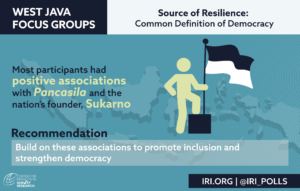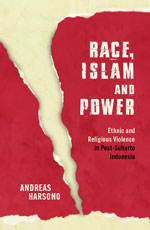 On the eve of historic elections, a conundrum lies at the heart of Indonesian politics. Successive governments have built one of the most important foundations of a successful democracy: free, fair, and peaceful elections. However, while its electoral procedures are robust, Indonesian democracy is increasingly defective in other areas, notes analyst Ben Bland, Director of the Lowy Institute’s Southeast Asia Project.
On the eve of historic elections, a conundrum lies at the heart of Indonesian politics. Successive governments have built one of the most important foundations of a successful democracy: free, fair, and peaceful elections. However, while its electoral procedures are robust, Indonesian democracy is increasingly defective in other areas, notes analyst Ben Bland, Director of the Lowy Institute’s Southeast Asia Project.
President Joko Widodo, who is the favorite to be elected again in April, rose to power thanks to the competitive nature of Indonesian elections. Yet, he has proven to be a poor guardian of democracy, he writes in a thorough new analysis:
Jokowi, as he is known, has sought compromises with corrupt politicians and intolerant religious leaders, and surrounded himself with former generals with little commitment to democratic principles. On his watch, human rights, the rule of law, and the protection of minorities have all weakened. A bitter form of religion-based identity politics seems to be embedded in the system. As Indonesia faces growing challenges, its future will be defined by how the next generation of leaders use the powerful mandate of electoral victory to overcome those who are seeking to stymie much-needed reforms and undermine democratic norms.
 Political changes in post-Suharto Indonesia have triggered ethnic and religious violence across the country, says a book by Andreas Harsono, a veteran Indonesia researcher for Human Rights Watch, published today.
Political changes in post-Suharto Indonesia have triggered ethnic and religious violence across the country, says a book by Andreas Harsono, a veteran Indonesia researcher for Human Rights Watch, published today.
The 280-page book, Race, Islam and Power: Ethnic and Religious Violence in Post-Suharto Indonesia, was published by Monash University Publishing a week before Indonesia’s general elections on April 17, 2019. Harsono spent five years travelling around Indonesia, from the westernmost island of Sabang to its easternmost city of Merauke in West Papua, from Miangas Island in the north, near the Philippines border, to Ndana Island, near the coast of Australia. Harsono’s journey took him to more than 90 locations, including 41 small towns and 11 remote islands. Many of those locations were the sites of either state or communal violence.
A decade ago, Rizal Sukma, one of Indonesia’s most eminent policy analysts (and the current ambassador to the United Kingdom), published a paper arguing that the country’s politics were characterised by “defective elections, resilient democracy”[3]. Now, Indonesian politics looks more like a story of “resilient elections, defective democracy”, Bland adds:
This tension between resilient elections and defective democracy partly reflects the political compromises of reformasi, which ended the Suharto regime and kick-started democratisation. The tension is embodied in Jokowi who won power because of competitive elections but has presided over a period of democratic backsliding, whether through neglect or intent.







